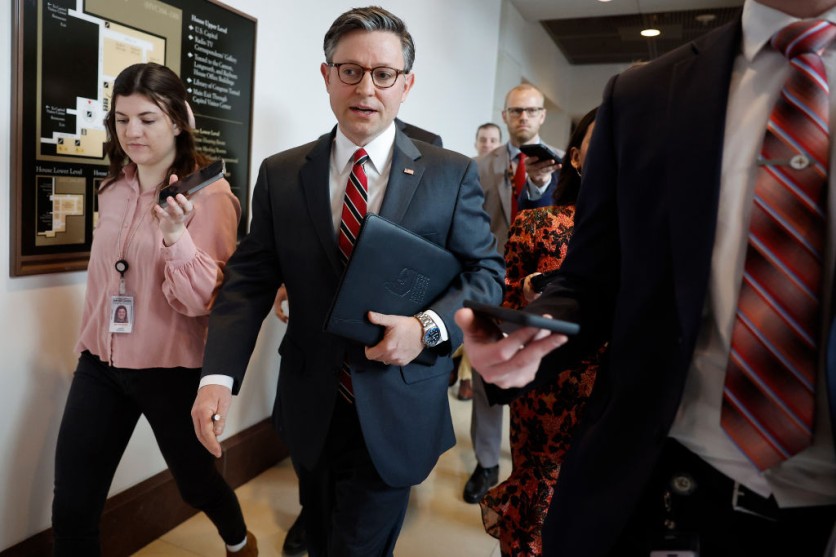US House leaders on Tuesday launched a bipartisan task committee to address concerns over the risks posed by artificial intelligence (AI). High-level forums and legislative initiatives have failed to enact AI-related legislation, prompting House Speaker Mike Johnson (Republican) and Democratic Leader Hakeem Jeffries to step up.
The newly established task force has been assigned the responsibility of generating a comprehensive report, with a particular emphasis on exploring "guardrails that may be appropriate to safeguard the nation against current and emerging threats" linked to AI, as reported by Reuters.
This initiative comes in the wake of the excitement and apprehensions surrounding generative AI, capable of creating text, photos, and videos in response to open-ended prompts, raising concerns about job displacement, election interference, and potential catastrophic effects on society.
A fake robocall in January that attempted to dissuade voters in New Hampshire's Democratic primary by impersonating President Joe Biden served to highlight the urgency of addressing AI-related issues. Responding to such threats, the Federal Communications Commission recently declared AI-generated voice calls illegal.

(Photo: Chip Somodevilla/Getty Images) Speaker of the House Mike Johnson (R-LA) is surrounded by staff, journalists, and security as he heads back to his office following a news conference at the U.S. Capitol Visitors Center on February 14, 2024, in Washington, DC.
What to Expect
The task force report will contain guiding principles, forward-looking recommendations, and bipartisan policy suggestions in cooperation with Congressional committees. Artificial intelligence presents unique problems, and Hakeem Jeffries stressed the need for guardrails to safeguard the American people.
Representative Jay Obernolte, the Republican chair of the 24-member task force, emphasized that the report will outline regulatory standards and Congressional actions to simultaneously protect consumers and foster continued investment and innovation in AI.
Last week, major technology companies, including Adobe, Amazon, Google, Meta, Microsoft, OpenAI, and TikTok, made a voluntary commitment during the Munich Security Conference to adopt "reasonable precautions" to prevent the misuse of AI tools from disrupting democratic elections globally.
TechTimes earlier reported that this collaborative effort resulted in a new voluntary framework designed to address AI-generated deepfakes, particularly those aimed at misleading voters. While the voluntary framework holds symbolic weight, it aims to counter the increasing danger posed by realistic AI-generated images, audio, and video capable of manipulating political figures and election officials.
Signatory tech companies, though not committing to a complete ban or removal of deepfakes, have outlined methods to detect and label deceptive AI content on their platforms. The agreement emphasizes sharing best practices among signatories and committing to "swift and proportionate responses" when deceptive content circulates.
With the 2024 national elections approaching in over 50 countries, the Munich Security Conference agreement assumes crucial significance. Despite its symbolic nature, the pact signifies collaboration among major technological companies to address the challenges posed by AI-generated content during elections.
In October, President Biden signed an executive order to mitigate AI risks, while in January, the Commerce Department proposed regulations requiring US cloud companies to scrutinize foreign access to domestic data centers for AI model training.
Mark Zuckerberg: Do Not Blame AI for Tech Layoffs
Meanwhile, Mark Zuckerberg, CEO of Meta, attributed ongoing tech industry layoffs to the aftermath of the COVID-19 pandemic rather than the influence of AI. In a recent Morning Brew Daily Podcast episode, Zuckerberg clarified that the persistent tech layoffs resulted from pandemic-induced overbuilding, not AI displacing jobs.
Acknowledging the trend, Zuckerberg emphasized that businesses recognize the advantages of operating more efficiently, although "AI stuff" was not a significant factor in layoffs within his companies. According to a Challenger, Gray & Christmas survey, January witnessed a substantial increase in announced job removals, reaching the second-highest total since 2009 at 82,307, marking a 136% rise from the previous month.

ⓒ 2026 TECHTIMES.com All rights reserved. Do not reproduce without permission.




